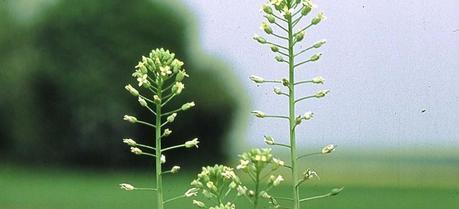 Researchers to develop Camelina sativa as a biodiesel crop for the Great Plains. (Credit: Fornax http://commons.wikimedia.org/wiki/User:Fornax)
Researchers to develop Camelina sativa as a biodiesel crop for the Great Plains. (Credit: Fornax http://commons.wikimedia.org/wiki/User:Fornax)Camelina sativa, a flowering plant native to Europe and to Central Asia, can be a valuable biofuel crop because it can grow on poorer quality farmland and needs little irrigation and fertilizer.
A Kansas State University biochemist is improving biofuels with a promising crop: Camelina sativa. The research may help boost rural economies and provide farmers with a value-added product.
SEE ALSO: Miscanthus Giganteus Better Than Switchgrass for Biofuel Production

Durrett and collaborators are developing Camelina sativa as a biodiesel crop for the Great Plains. This nonfood oilseed crop can be rotated with wheat, Durrett said.
“Camelina could give farmers an extra biofuel crop that wouldn’t be competing with food production,” Durrett said. “This research can add value to the local agricultural economy by creating an additional crop that could fit in with the crop rotation.”
The research will take advantage of the recently sequenced camelina genome. For the project, Durrett is improving camelina’s oil properties and by altering the plant’s biochemistry to make it capable of producing low-viscosity oil.
Developing low-viscosity oil is crucial to improving biofuels, Durrett said. Regular vegetable oil is too viscous for a diesel engine, so the engine either has to be modified or the vegetable oil has to be converted to biodiesel. Camelina could provide a drop-in fuel that could address this issue.
“By reducing the viscosity, we want to make a biofuel that can be used directly by a diesel engine without requiring any kind of chemical modification,” Durrett said. “We would be able to extract the oil directly and use it in a diesel engine right away.”
Although low-viscosity oils are a valuable fuel source, they also are valuable for a variety of other industrial uses, such as plasticizers, biodegradable lubricants and food emulsifiers, Durrett said.
The research also could create a value-added product for farmers. Modified oils have the potential to become more valuable than regular vegetable oil, Durrett said.
“It is important to reduce our dependence on fossil fuels, but the hope is that we also could help improve the rural economy by giving farmers a value-added product that they can produce directly,” Durrett said. “Rather than having a chemical company or a biofuel company take raw vegetable oil and modify it, the plant actually performs the chemistry and the farmers harvest that value-added product themselves.”
John McCay, Colorado State University bioagricultural sciences associate professor, is leading the collaborative project, “Biofuels In The Arid West: Germplasm Development For Sustainable Production Of Camelina Oilseed.” The work also involves researchers from the University of Nebraska, Lincoln and the University of California, Davis.

